When will they join?
The United States of American was very reluctant to get involved in World War One. President Woodrow Wilson believed that the U.S.A could act as a mediator to bring about peace in Europe. Wilson’s neutrality stance demonstrated by his slogan ‘He kept us out of the war.’ played a significant part in getting him re-elected in 1916.
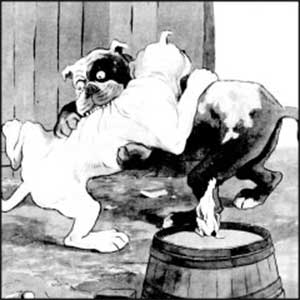
‘Neutrality’ published in the Western Mail 30 April, 1915
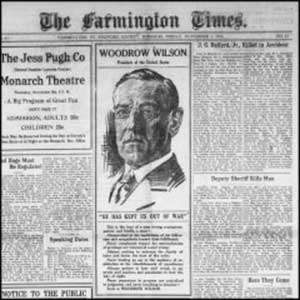
Advert from Woodrow Wilsons Presidential campaign
Advert from Woodrow Wilsons Presidential campaign published in local newspapers across America, including the Farmington Times in Missouri, November 3, 1916.
Ben Strange was highly critical of President Wilson’s stance and regularly pushed the idea that America was more interested in the economic benefit from the war than trying to stop it. Even when in 1915 over a thousand passengers and crew, including 128 American citizens, died when German submarines attacked and sank the British ocean liner RMS Lusitania, Strange asserted that Wilson and America was more interested in the ‘dollars and dimes’ than human lives.
President Wilson believed that America had a role to play in bringing ‘peace and goodwill’ to the world and in January 1917 called for (Wilson speech 22 January 1917) ‘peace without victory’ in Europe and the establishment of a League of Nations. A month before Germany had also called for peace, though on the condition that negations were based on the existing font line, giving them dominion over Belgium and the north of France with its coal and iron fields. These unacceptable conditions forced the Allied Nations to be the ones to reject the peace deal and be perceived as wanting to continue the war. Germany responded by launching a campaign of unrestricted submarine warfare against any ship it believed was taking supplies to an enemy nation including American ships.
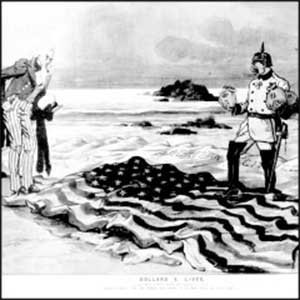
‘Dollars v Lives’ published in the Western Mail May 21, 1915 a few weeks after the sinking of the RMS Lusitania on May 7, 1915.
In March 1917 the American public learnt that Germany had attempted to ally with Mexico, which was rejected, and convinced them to invade America from the south. Seeing that ‘peace without victory’ was not possible President Wilson declared before a join sitting of government (Complete speech) “The present German submarine warfare against commerce is a warfare against mankind. It is a war against all nations…
I advise that the Congress declare the recent course of the Imperial German Government to be in fact nothing less than war against the government and people of the United States;” On April 6 the United States Congress declared war on Germany.
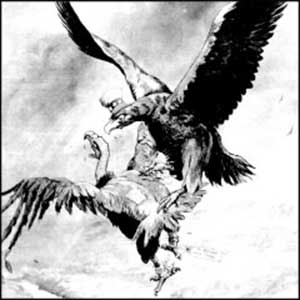
‘At Last’ published in the Western Mail April 12, 1917 six days after America declares war on Germany.
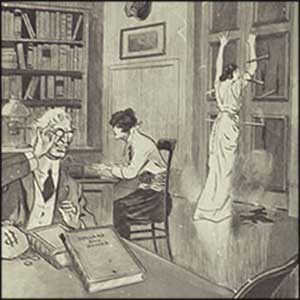
‘His Trouble’ Western Mail June 9 1916
Caption: British newspapers comment sharply upon President Wilson’s assertion that the United States has no concern in the causes or the objects of the war. (Cable.)
President Wilson: “Never mind the disturbance outside, Miss Columbia --- it’s no concern of ours --- tell Bernstorf ‘The relatives of the last batch of submarined Americans are making an awful fuss. Please explain.’”
This cartoon is implying that President Wilson was more interested in America benefiting financially from the war in Europe despite the threat to civilisation and the killing of American citizens; including those who died aboard the RMS Lusitania which German submarines sank on May 7, 1915. In the cartoon Wilson is dictating a letter to the German ambassador Count Von Bernstorf.
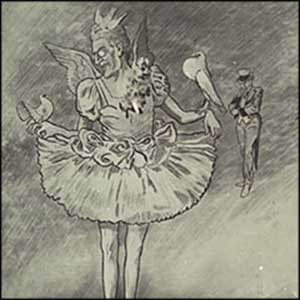
The Great Peace Poser Western Mail February 2 1917
“More limelight please”
This cartoon appeared soon after President Wilson gave a speech to the United States Senate calling for peace without victory in Europe. Germany was calling for peace based upon retaining captured territory, including Belgium and the northern coal and iron fields of France. These demands were unacceptable to the Allied Forces who wanted Germany to withdraw and to pay reparations. Ben Strange depicted President Wilson, who offered to help negotiate the peace, as demanding the personal limelight as Uncle Sam looked on in displeasure at his behaviour.

